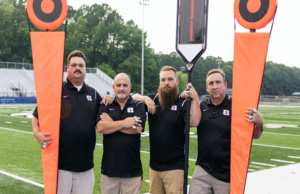It’s Child’s Play

As the very cool aunt of eight rough and ready boys, I can love to watch my sister-in-law answer questions about her thoughts on their extracurricular activities. As she starts listing off the various activities that keep them busy year-round, people are always surprised to learn a few of them play tackle football at such a young age. “Aren’t you afraid they will get hurt?” “Aren’t you afraid of concussions?” Most of the time, the look on each person’s face talks before they do.
And, you know what? I get it. I really do. While neither of my two daughters is interested in playing football, their chosen sports of competitive cheer and dance can still be very dangerous.
As an insurance agent, I understand the risk of injury to children who play sports all too well. This time of year, especially, I see the emergency room claim forms roll in.
Of course, as parents, we worry about their getting hurt. When it comes to those high impact sports like football, soccer, and hockey, we worry about serious brain injury. While we normally associate concussions with these sports, it could happen with any of the high impact sports like cheerleading, gymnastics, skateboarding, or even riding a bike!
I actually know a little girl who experienced a concussion because of a bike wreck. So scary! Since we can’t wrap them in bubble wrap until they are eighteen, let’s take a moment to break down what to look for if you believe your child has suffered a concussion.
First of all, did you know you do not have to become unconscious? According to the Child Mind Institute, symptoms include headache, dizziness, nausea, slurred speech, vomiting and amnesia. These indicators may not even occur for hours or even days later. Other symptoms include sensitivity to light, irritability, difficulty sleeping, and even depression.
Most importantly, what should you do when you recognize a concussion may have occurred? Basically, immediately stop the activity and seek medical attention. Seems simple enough, right? Unfortunately, lots of parents and caregivers choose not to visit a medical professional because of the rising costs of care and the popularity of high deductible health insurance plans.
That’s where I come in. Unexpected (and unwelcome) medical expenses have a way of creeping their way into our wallets. A primary health insurance plan will pay for most of them, but an unexpected emergency room visit can disturb your family budget. This is where a supplemental medical insurance policy can help.
I sell hospital income supplemental insurance to protect your budget. In many cases, the policy benefits are paid directly to the policyholder so the money can be used to pay for a high-deductible or coinsurance that isn’t covered by your primary plan. I have also personally witnessed parents use it to pay for travel costs incurred due to the unforeseen medical event.
It’s important to note that not all plans are equal. Choosing the right supplemental health insurance plan is a very important decision. For all of the details and guidance about the different types of plan, be sure to ask your local insurance agent.
These policies are one of the reasons I love so much what I do. It feels so good to take away a little stress during what is a very stressful time.
I believe this “feeling” I just described is an insurance agent’s best kept secret. I didn’t grow up wanting to be in insurance. The truth is, I started in this business because I really needed a job while I figured out what I wanted to do with my career long-term. I never expected to fall hard for that 15-minute feeling I got right after I paid a claim, met with a client to review their coverages or spoke to a group of kids about the consequences of distracted driving. When you purchase an insurance policy, you aren’t just buying a piece of paper, but a promise of security.
It is my hope that you will fill your life with more security and less worry.
While these “collision sports” carry a certain amount of risk, it’s important to realize most kids who experience concussions get completely better within a few days or weeks. As adults, we know that teamwork is an important life skill and there’s no better way to learn teamwork than to be on a team as a kid.
These extracurricular activities allow kids to broaden their interests, develop leadership skills and strengthen their connections with their friends and community. Stay safe, my friends, and good luck with your upcoming seasons.









0 comments